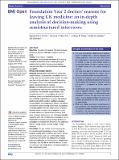Foundation Year 2 doctors’ reasons for leaving UK medicine : an in-depth analysis of decision-making using semistructured interviews
Date
02/03/2018Metadata
Show full item recordAbstract
Objectives: To explore the reasons that doctors choose to leave UK medicine after their foundation year two posts. Setting : All four regions of Scotland. Participants: Foundation year two doctors (F2s) working throughout Scotland who were considering leaving UK medicine after foundation training were recruited on a volunteer basis. Maximum variation between participants was sought. Primary and secondary outcome measures: Semistructured interviews were coded using template analysis. Six perspectives, described by Feldman and Ng, were used as the initial coding template. The codes were then configured to form a framework that explores the interplay of factors influencing Foundation Year 2 (F2) doctors’ decisions to leave UK medicine. Results: Seventeen participants were interviewed. Six perspectives were explored. Structural influences (countrywide and worldwide issues) included visas, economic and political considerations, structure of healthcare systems and availability of junior doctor jobs worldwide. Organisational influences (the National Health Service (NHS) and other healthcare providers) included staffing and compensation policies, the working environment and the learning environment. Occupational influences (specific to being a junior doctor) comprised the junior doctor contract, role and workload, pursuit of career interests and the structure of training. Work group influences (relationships with colleagues) included support at work, task interdependence and use of locums. Personal life influences consisted of work-life balance, and support in resolving work-life conflict. The underlying theme of ‘taking a break’ recurred through multiple narratives. Conclusions: F2s give reasons similar to those given by any professional considering a change in their job. However, working within the NHS as an F2 doctor brought specific challenges, such as a need to make a choice of specialty within the F2 year, exposure to workplace bullying and difficulties in raising concerns. Despite these challenges, most F2s did not view their decision to leave as a permanent job change, but as a temporary break from their current working lives.
Citation
Smith , S E , Tallentire , V R , Pope , L M , Laidlaw , A H & Morrison , J 2018 , ' Foundation Year 2 doctors’ reasons for leaving UK medicine : an in-depth analysis of decision-making using semistructured interviews ' , BMJ Open , vol. 8 , e019456 . https://doi.org/10.1136/bmjopen-2017-019456
Publication
BMJ Open
Status
Peer reviewed
ISSN
2044-6055Type
Journal article
Description
This work was funded by a Scottish Medical Education Research Consortium grant.Collections
Items in the St Andrews Research Repository are protected by copyright, with all rights reserved, unless otherwise indicated.

